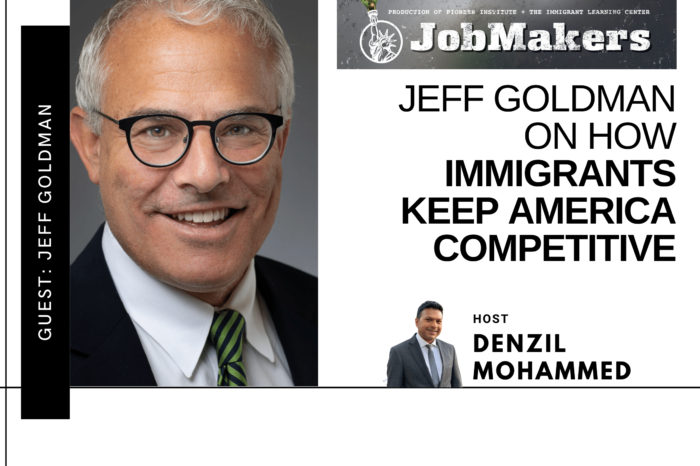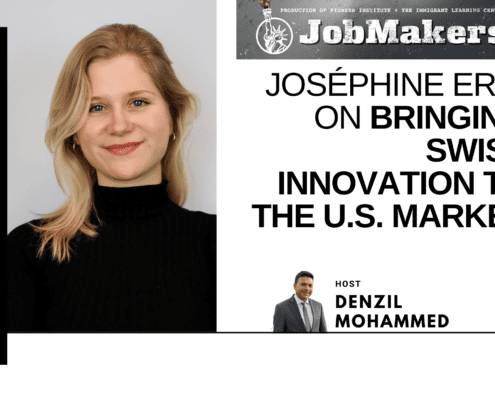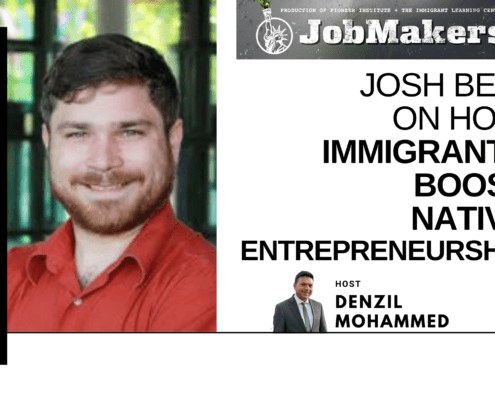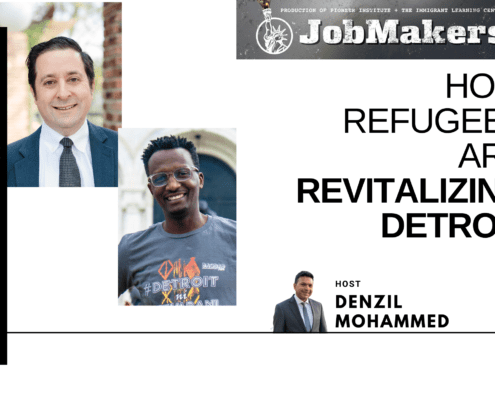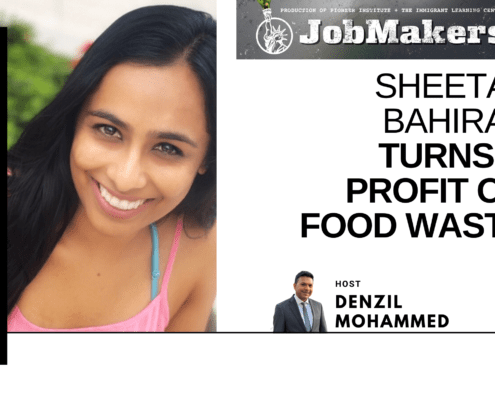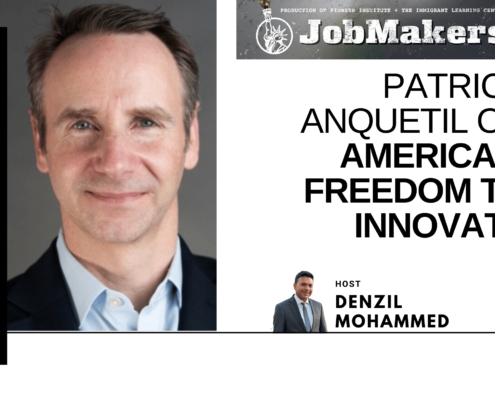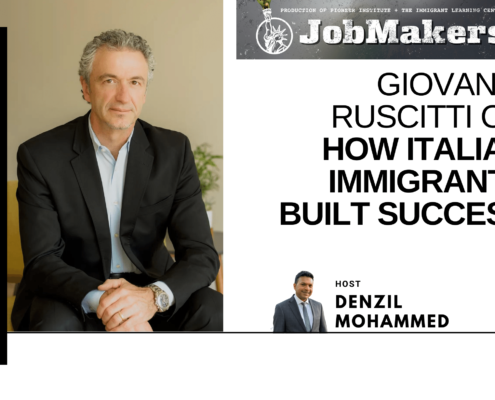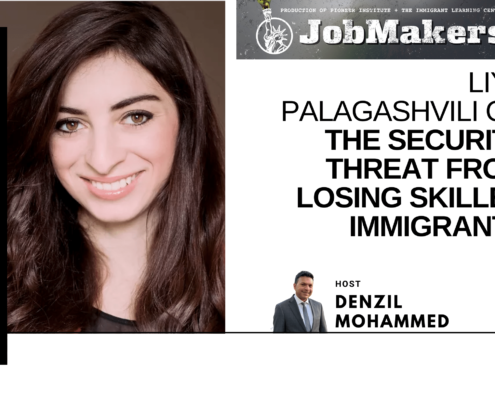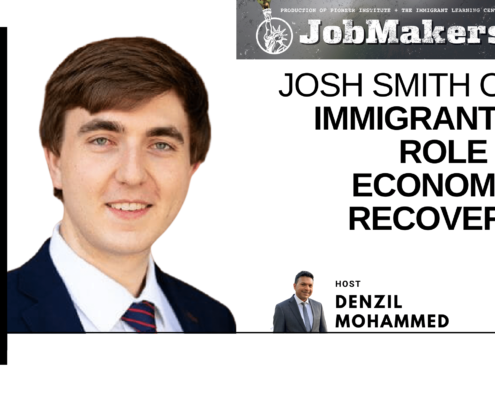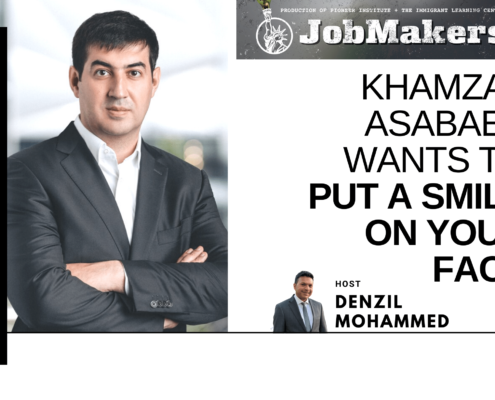Jeff Goldman on How Immigrants Keep America Competitive
Immigrants innovate. Kendall Square in Cambridge or Silicon Valley wouldn’t be what they are today without the innovation and ingenuity of immigrants. But the dense and convoluted immigration system doesn’t always allow for that retention of skill and talent. This week on JobMakers, Host Denzil Mohammed talks with Jeff Goldman, immigration attorney and Chair of Massachusetts Governor Charlie Baker’s Advisory Council on Immigrants and Refugees, about how best to ensure that highly skilled and innovative immigrants can remain in the U.S., start companies, and create jobs for Americans. Jeff co-founded the Massachusetts Global Entrepreneur in Residence program for immigrant university students to continue learning, teaching, and innovating. Jeff sees how much skilled immigrants add to our economic vibrancy and innovative edge, and he’s also keenly aware of the tremendous impact on our daily lives of undocumented immigrant workers and what Massachusetts has done to enable them to thrive.
Guest:
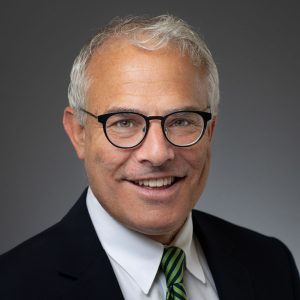
Jeff Goldman practices exclusively in the areas of business and family immigration law. He has more than two decades of extensive experience representing startup to Fortune 1000 technology, life science and medical device companies, as well as families, in all visa and permanent residency matters. Jeff is passionate about entrepreneurship, families and the innovation economy. After over a decade leading the immigration law sections at Mintz Levin and Testa, Hurwitz & Thibeault, Jeff opened his own practice in Salem and Cambridge, Massachusetts and San Mateo, California.
Get new episodes of JobMakers in your inbox!
Read a Transcript of This Episode:
Denzil Mohammed:
I’m Denzil Mohammed, and this is JobMakers.
Denzil Mohammed:
Immigrants innovate Kendall Square in Cambridge or Silicon Valley wouldn’t be what they are today without the ingenuity of immigrants, but the dense and convoluted immigration system doesn’t always allow for that retention of skill and talent, which would of course, be to America’s benefit for Jeff Goldman, immigration attorney and chair of governor Charlie Baker’s advisory council on immigrants and refugees ingenuity to tackle that convoluted system was what was needed to ensure highly skilled and innovative immigrants could remain in the U S to start companies and create jobs for Americans. Jeff cofounded, the Massachusetts global entrepreneur in residence program, which modeled new ways for foreign born university students to continue learning, teaching, innovating and creating jobs in the U S Jeff sees how much skilled immigrants add to economic vibrancy. And he’s also keenly aware of the tremendously positive impact on our daily lives of undocumented workers and what Massachusetts has done to enable them to thrive. As you learn in this week’s JobMakers. Welcome, Jeff Goldman.
Jeff Goldman:
Thank you, Denzil
Denzil Mohammed:
An immigration attorney, which means you help people come to the U S legally. Immigration a good thing for the country and the Commonwealth. How do you know this?
Jeff Goldman:
Immigration is such a positive thing for the United States and for the Commonwealth of Massachusetts. And I know it because I see it every single day. And I also know it because there are so many authentic reports that are put out by respected non-government organizations, bipartisan commissions, all pointing to the benefits of immigration to the United States. I see it every day, Denzil, because in my practice, we’re mostly working with business immigration, helping us employers grow and expand in this economy. And they do it with US workers. And when they can’t find enough us workers, they look to hire foreign nationals. And my law firm was very busy and making sure that they hire foreign nationals through the legal system and that every everything is done. And every time we get an H1B visa, L1, 01 visa, green card for these companies, we see them grow again and hire again, mostly US workers, but filling in with foreign nationals as needed.
Denzil Mohammed:
I asked you also about your clients and who they are. You said business, immigration and companies, like what kinds of companies have you worked with, and also tell us, you know, over the years that you’ve been practicing, has immigration law become easier or harder?
Jeff Goldman:
Well, the companies I’m working with are mostly in the life science, pharmaceutical sectors, a lot of technology manufacturing, and definitely finance. All of them, all of the companies. And I’m talking about hundreds of companies that I represent are in growth mode. Uh, it’s been a long time since I received a request on what to do, or if they’re laying off a foreign national or any worker they’re growing and they’re hiring and immigration plays such an integral part. Has immigration become easier or more difficult over the years? I think it’s clear it’s become more difficult for many reasons. First of all, the demand to employ foreign nationals has never been greater in the U S economy than it is today. Most of your listeners may or may not know that the number one way foreign national professionals come to work inside the United States is through the H1B visa.
Jeff Goldman:
It’s one of the only ways tech companies can get software engineers that they desperately need. Life science company can get biologists, chemists, scientists, and, and, and financial organizations hire the right MBAs and other leading financial experts to work inside the United States. But the H1B is limited to 85,000 every fiscal year. The demand is in the hundreds and hundreds of thousands. And that’s the lottery is set up and only 85,000 and selected every fiscal year. This is almost crisis situation where companies need these foreign nationals to continue to grow and expand. But the supply is not there. Critical point. These companies must pay the fair wage. These companies cannot undermine the US labor force to bring in foreign national professionals to work. And for the most part, this works just fine. How do I know that? No company would pay immigration lawyers the fees we charge and the government, the filing fees that the government charges to bring in a foreign national who is paid less. It’s not worth it. They’re paying so much in costs and fees that they wouldn’t do this. Nobody would do this.
Denzil Mohammed:
You hint at this scarcity of high skilled workers in the U S especially today where we see technology driving so much of the economy. So therefore you must have a very negative view on the past administrations’ really dramatic crackdown on legal immigration to the U.S., right?
Jeff Goldman:
Correct. The Trump administration is one of the first times I’ve known in my 30 years of practicing immigration law, where a president tapped all aspects of legal immigration and claimed all of it is bad for the United States, contrary to mountains of evidence that state otherwise. And of course, we now know President Trump did this for his political agenda, to make sure that voters who were leaning toward President Trump, who are not generally in favor of immigrants, to make sure they had a lot of fuel in the fire, to get them all excited, to continue to jump on the Trump bandwagon. And it’s really unfortunate because had we just spent all of that time and energy trying to fix the problems with legal immigration rather than end it, we’d all be much better off today.
Denzil Mohammed:
You said that this was one of the first times that you saw these kinds of actions. And it’s something I keep saying on this podcast. If immigration was bad for the U S you know, why did we have it in the first place? It just so happens that we have the greatest economy in the world, and we’ve always accepted immigrants. These people who are self-selected to have this drive and ambition and determination to do better. Do you see however, a real way to rebuild, since Trump and is the Biden administration moving in the direction that you’d like?
Jeff Goldman:
Administration is cautiously moving in the right direction. President Biden has set forth a wide range of immigration reforms he would like to see during his administration, but he readily admits he’ll never get to all of them. And I think at the top of the list is DACA finding a solution to the hundreds of thousands of immigrants who arrived without authorization as children due to no fault of their own and are here. And they’ve been here their whole lives, and they add an add an add to our economy and our country. I am convinced on both sides of the aisle is ready to move ahead with DACA and, and make it a permanent solution.
Denzil Mohammed:
I think I distinctly remember then-candidate Trump saying that DACA recipients had nothing to worry about. And then once he was elected, Jeff Sessions comes out and says, hang on. And this political football that they are playing in terms of these lives and futures of these young people is, is beyond tragic. And as you mentioned, most of the public is in favor of some sort of path to legalization for these young people who have been through our education system, who deserve in-state tuition, who deserve to have careers, where they are able to pay more in taxes and contribute more, but let’s bring the discussion locally. So you’ve been instrumental in several initiatives that both offer foreign talent, the chance to remain in the US and thrive, but also that nurture a narrative that emphasizes what the data, as you said, the mountains of evidence have already told us that immigrants are assets. One of those initiatives is called the global entrepreneur in residence program. Tell us about that and the kind of growth that is experienced over the past few years.
Jeff Goldman:
Sure. Well, the global entrepreneur in residence program was created six years ago by a group of immigration lawyers, venture capitalists, corporate attorneys, and the government of Massachusetts who came together to brainstorm brainstorm solutions on how Massachusetts could continue to grow. Even though the H1B visas were so limited. And so many Massachusetts companies were left shorthanded in terms of software engineers and scientists in order to move ahead. And I was on that committee and on that group, and we came up with a solution, one solution, which came to be known as the Massachusetts global entrepreneur in residence program, or the GEIR. Here’s the solution, the H1B regulations limit the number of H1B visas every year. However, there is an exception to the rule. There are four organizations that are called cap-exempt organizations. They can always hire an H1B any time.
Jeff Goldman:
Those four organizations are universities, non-profit research organizations, government research organizations, and non-profit organizations that have an affiliation agreement with a university that benefits the university. Congress decided these four organizations are so integral to the growth of the US economy, that they should always be able to hire an H1B when needed, but that doesn’t exactly help all of the private companies that desperately need these H1B workers. Well, I was familiar with one other exception in the immigration code, and that exception is this, if a foreign national is present in the United States in H1B status, then any entity, whether it be a nonprofit or a for-profit, whether it’s a government organization or a private organization, any entity can immediately file its own concurrent H1B petition and hire that same foreign national for full-time work at that entity. We presented this proposal to the University of Massachusetts and the University of Massachusetts at Boston jumped at the chance to participate in this innovative workaround.
Jeff Goldman:
So what’s happened in the past six years since this program has come into being? Hundreds of talented foreign nationals who were running out of work authorization and had nowhere to go have been legally employed by the University of Massachusetts at Boston, University of Massachusetts at Lowell, Babson College, Worcester PolyTech and other universities who are participating in the Massachusetts global entrepreneur in residence program. Private companies have been able to retain them because they have cap exempt H1B status, and those private companies in the six years, since our program started have hired thousands of us workers since our program started, since they were able to capture these valuable H1B workers, they have landed hundreds of millions in venture capital funding, all of that money, staying here in Massachusetts, it’s been a win, win, win situation,
Denzil Mohammed:
But you said that, you know, I thought that if an immigrant took a job, that’s one less job for Americans. And you are saying no, that an immigrant gets a job in the US at a high-growth company, that actually helps make the company grow and offer more jobs.
Jeff Goldman:
If there’s ever a time in our nation’s history, we need to celebrate this and expand it and grow it it’s now. Um, and we need to continue to be the attraction, the beacon of where these innovators and entrepreneurs want to be. We need to be inviting and welcoming and, and consistent. That’s what is so desperately needed in our immigration system.
Denzil Mohammed:
Consistency. And I guess for a short time, we didn’t have that consistency. And we saw the number of students applying to universities here drop off during the last administration. There was even an article in Forbes by Stuart Anderson who predicted that legal immigration to the U S would have dropped by as much as 49%, because of the Trump administration’s policies. But talk a little bit about your clients and your networks. What are the kinds of products and services and technologies you’ve seen your clients come up with and how do you see them benefiting the ecosystem here in Boston?
Jeff Goldman:
Well, some of the amazing clients I’ve had the privilege of, of working with our teams out of MIT, who are, are miles ahead in the effort to take ocean water and desalinate it and make it potable drinking water. This is something that people have talked about for hundreds and thousands of years. Wouldn’t that be amazing? And I think we’re closer than ever. And it’s foreign nationals out of MIT that are among the leaders working on this right now, I’m convinced that we wouldn’t have vaccines for COVID had it not been for the use of technology and immigrants are by far and large behind the advancement of combining technology and science. I have clients in the engineering space finding solutions for 3D printing that actually is printing PPE gear. The protective gear that nurses and doctors need, can you imagine that they’re now making this all out of 3D printing, all foreign nationals who came up with the algorithms and with the strategies and with the startup companies that are producing these materials.
Denzil Mohammed:
Talk about vaccines, Charles Pfizer, co-founder of Pfizer, and, um, Noubar Afeyan and Derrick Rossi co-founders of Moderna. So, yes, we probably would not have had those vaccines if it weren’t for immigrants. So really incredible things that happen when we allow foreign talent to come here and innovate with Americans. You’re also the chair of the governor’s advisory council on immigrants and refugees. Now, I remember that in 2009, the previous council had developed a very meticulous Massachusetts new Americans agenda. It continued to detailed proposals and recommendations to bring out the best in the states, immigrants and refugees, and covered everything from housing and language access to workforce development and civil rights. Where are we with this Massachusetts new Americans, new Americans agenda? Have any of the recommendations come to pass?
Jeff Goldman:
Yes. Without question, several of the recommendations have come to pass, um, and I want to, I can talk about a few of them. The first thing is, is informing or suggesting to the highest levels of our government to recognize the importance of immigrants in our economy. And without question, the last several governors who we have had in the state have celebrated the contributions of immigrants. Governor Baker himself has done so much to make sure the immigrant communities understand that they are valued and welcome in the economy. And that they are aware that the Commonwealth of Massachusetts cares just a few days ago, Governor Baker was among the first governors in the entire United States to issue a statement, advising all Afghan citizens of the Commonwealth, that they are welcome here, that we are here to help them find solutions. He has repeatedly spoken in public about the need for immigrants to get COVID testing and vaccines, and has even let the undocumented immigrant community know that they are absolutely welcome to participate in COVID vaccines and COVID testing.
Jeff Goldman:
This doesn’t go on around the entire country. Another recommendation of the group you discussed was to find ways to integrate immigrants, legal immigrants in the Commonwealth, into the professions, and integrate them in to everyday fabric of American life and the Commonwealth. And since that recommendation has been made, a lot of money has been put into the state budget to help integration, starting with naturalization. It’s really hard to integrate immigrants if they don’t want to step forward and be part of the Massachusetts cultural and civic environment, and naturalizing foreign nationals eligible to become legal citizens of the United States is really the starting point. So ever since the Commonwealth has added to its budget, the efforts of the Massachusetts office of refugee and immigrants to help naturalize foreign nationals, I think the number of naturalizations of Massachusetts immigrants has just exponentially expanded.
Jeff Goldman:
One of the biggest parts of the new American agenda was to find ways to help new Americans, legal foreign nationals work in the very careers in which they were trained outside the US, maybe specifically doctors and nurses, and the Commonwealth successfully did help foreign doctors who might not yet be licensed due to the very restrictive licensing rules we have in the Commonwealth and across the United States, licensing rules for doctors, there was the ability during the COVID crisis to permit foreign doctors to help with some of the urgent medical needs that came about during COVID.
Denzil Mohammed:
You did make a lot of distinctions in terms of what Massachusetts has done for legal immigrants. And you did mention, COVID testing for undocumented immigrants. I would venture to suggest that immigrants documented or not, they’re all part of our economy. You take undocumented immigrants out, and who’s going to pick half of the fruits and vegetables in this country, who is going to take care of the sick? So in a sense, you can’t always parse out, let’s say for instance, federal aid that went out last year, not to families with undocumented immigrants. Massachusetts got together and formed the Mass Undocu Fund to help fill that gap. Several other states, even red states have done things that Massachusetts is not for its undocumented population. Things like, offering in-state tuition to undocumented students, something as simple as that, so that they could continue and contribute more. Where do you see Massachusetts having not met the grade?
Jeff Goldman:
I think Massachusetts celebrates immigrants. I think we do a lot to help even the undocumented. However, it is true. We have not passed a law allowing for in-state tuition, and we have not passed a law, allowing undocumented people to have driver’s licenses, even though there’s much out there showing that this is a benefit to us and, showing that it does not take away, it’s a very sensitive subject. Um, and I respect, I can’t say I support, but I respect Governor Baker’s opinion that now is not the time to push these issues. But I think, I think overall, even undocumented people would say that Massachusetts has done a pretty good job of helping them with their lives and permitting them to continue to add to the economy as best as they can. But we’re progressive, we’re smart. We understand the deep, deep connection between all immigrants, both documented and undocumented in this economy.
Denzil Mohammed:
Jeff Goldman, I could talk to you forever about this, these topics, and there’s so much more I want to get into. But I think we’re out of time for job makers this week. Thank you so much for making the time to do this. I really appreciate your insights, your perspectives and, just the information that you were able to bring to the audience. Thank you so much.
Jeff Goldman:
Thank you, Denzil. And thanks to all the listeners out there for listening to me today.
Denzil Mohammed:
Job makers is a weekly podcast about immigrant entrepreneurship and contribution produced by pioneer Institute. I think tank in Boston and the immigrant learning center of Malden, Massachusetts, a not-for-profit that gives immigrants a voice. Thank you for joining us for this. Week’s fascinating discussion on how immigrant talent makes a better us. If you know someone, we should talk to email Denzel that’s D E N Z I L at jobmakers, podcast.org. Leave us a review on your favorite streaming service too. I’m Denzil Mohammed. Join us next Thursday at noon for another Jobmakers.
Recent Episodes:

